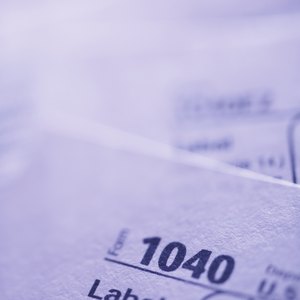
The joy of winning a new car may quickly subside into anxiety and worry when tax forms start to arrive in the mail. Although winning a new car may seem lucrative, taxpayers often don't consider the potential tax consequences. New cars generally cost tens of thousands of dollars. Taxpayers must report the value of these winnings on their tax returns.
Taxes on Prizes
One of the basic concepts of individual income taxation is that any clearly realized accession to wealth is generally taxable. Prizes — both cash and noncash varieties — are clear accessions to wealth. If you win a car, you must report it as income on your tax return. Depending on what you do with the prize and how you use the prize, you may be able to alleviate some of the tax burdens.
Fair Market Value
The IRS considers winnings from lotteries and raffles as gambling winnings. To calculate the tax owed, the IRS requires the winner to report the fair market value of the noncash prize on Line 21 of his 1040 tax return. In general, the person or entity presenting the car to the taxpayer must submit a 1099 with the IRS and the taxpayer listing the car’s fair market value. It's possible to overstate the amount of the winnings: Bankrate.com suggests having the car appraised to determine its fair market value if the taxpayer is unsure about the amount.
Alleviating the Tax Burden
Winning a new car may place the taxpayer into a higher tax bracket; he may incur thousands of dollars in tax liability from the win. The taxpayer has the option of rejecting the car. Another route is to donate the vehicle: Section 74(b)(3) of the Internal Revenue Code allows taxpayers to exclude the amount of prizes from gross income if the taxpayer won the prize in recognition of religious, charitable, scientific, educational, artistic, literary or civic achievements but immediately transferred the prize to a governmental unit or charitable organization.
Other Issues
Taxpayers may also find relief by putting the car into service as a business vehicle. Taxpayers may take advantage of certain expenses related to the business use of the car, such as deducting costs for mileage and repairs.
In addition to federal taxes, taxpayers may incur state tax liability. In Washington, for example, unless the donor paid the sales or use tax associated with the gift, the taxpayer is liable for those costs as well. Because of the financial and legal obligations associated with winning a car, taxpayers should consult a tax professional before accepting or using the vehicle.
References
Writer Bio
Based in Traverse City, Mich., George Lawrence has been writing professionally since 2009. His work primarily appears on various websites. An avid outdoorsman, Lawrence holds Bachelor of Arts degrees in both criminal justice and English from Michigan State University, as well as a Juris Doctor from the Thomas M. Cooley Law School, where he graduated with honors.

